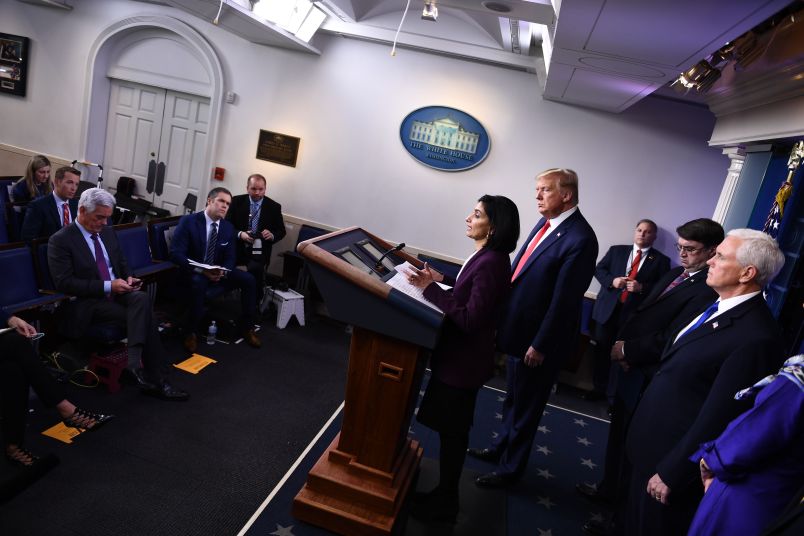The chaos of the coronavirus is scrambling all levels of health-care policymaking and analysis right now. It’s been just a few weeks since we started putting significant — and now total — attention on how medical providers, states and the federal government are responding to the crisis. Every day, the channels of information we’re working through are getting more convoluted and confusing.
For instance, there was a time early on when we could get officials from a state’s health department on the phone in a matter of minutes. Now even getting an emailed response to an inquiry can take hours, if not days.
The delay in response reflects not just how overwhelming the situation has now gotten in certain parts of the county, but also how fluid the circumstances are in the health care policy decisions experts are making. What could be true one day might not be true the next.
State officials in both Washington and North Carolina have bemoaned the “inundation” that has befallen them in conversations with TPM, saying that it has been difficult to manage constantly changing situations in their own states while anticipating what is to come.
For instance, a California doctor told us he saw no need for his emergency room to get relief from a federal mandate on which patients his hospital must treat, as other states are now trying to do. But he said that within a few days for that to change. That’s a far shorter time period than it usually takes for states to get such exemptions to federal health-care requirements approved.
And the outside experts who help us analyze what policies states and medical providers are pushing are facing their own challenges in digesting the firehose of information coming out.
Those experts have been giving us insight on what changes states want to make to their Medicaid programs to adapt to the crisis. But they’re having a harder and harder time keeping up with the slew of proposals. Right now, about a handful of states have filed waiver applications, some of them including dozens of proposed changes to health-care systems. Experts are expecting that number to grow significantly in the days to come, and are struggling to keep all the requests organized in a centralized place.
Likewise, the guidance that the Trump administration has issued to assist states in getting those changes approved has come at a rapid pace, and not all of the guidance documents fit neatly together.
Centers for Medicare & Medicaid Services director Seema Verma is holding regular phone calls with Medicaid administrators. One person who participated in a Wednesday evening call with Verma told TPM that she told the states, “tell us what you need, and we’ll get you what you need.”
But there hasn’t really been a template offered for what states can ask for in the case of a national catastrophe like a pandemic, and how they can ask for it. CMS has said it plans to put out a checklist states can use to streamline their efforts to change their programs.
States, it appears, don’t feel they have time to wait for that clarity about how they should be filing their requests. Instead, some are filing waiver applications citing multiple laws that could give the administration the authority to grant them the approvals they’re seeking.
The effect of this COVID-19 crush is also apparent in our dealings with U.S. Department of Health and Human Services, and specifically CMS.
There too, spokespeople have had trouble responding to our questions in time for our deadlines, and have acknowledged that their staff are facing a high volume of inquiries related to COVID-19 and the policies that CMS is rolling out.







This is pure Trump.
He destroys everything he does not understand or those who know more then he.
He does not understand that we need people who have dedicated their lives to service instead of seeking wealth.
Now with the virus he is still too stupid to understand what he has done.
Mission accomplished Donnie. You totally fucked our country.
Put this on billboards, social media, t-shirts, tv ads, radio, everywhere.
There is no perfect pandemic response BUT because the Irresponsible+Incompetent IMPeetus fired the whole WH Pandemic Team, America is now in this health crisis that could have been mitigated early on!
Everything Trump touches dies…Rick Wilson
Everytime Trump LIES, DENIES or Washes his hands of responsibilities during this pandemic…Americans DIES!
Take a listen to Trump’s Covid-19 LIES
https://www.youtube.com/watch?v=JxG241bExqYWhen the review happens I would like a list of the states that seem to have knowledgeable staff that know what they want, what it takes cite a law that’s keeping them from changing what they want to do, and are pushing forward.
Oh and while watching the local news I’ve found out the answer to why Missouri’s governor Parsons isn’t closing down businesses across the state. He said something to the effect “we reward risk takers, and small business owners are risk takers, so now is not the time to shut them down and maybe hurt them financially.” As it is the state has no cash reserves to help them, so let’s kill off the residents to help keep the businesses open.
So the IRS isn’t going to charge a penalty for paying your taxes late. You have until July 15th to pay, but still have to file by April 15th. I wonder what the states are going to do?
Seema Verma has YET to tell us anything worth listening to. She HAS however praised Donnie and engaged in word salad with the ‘media’. I want to slap her.